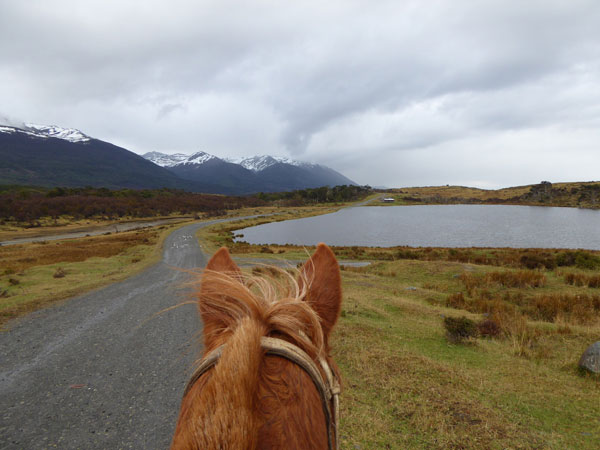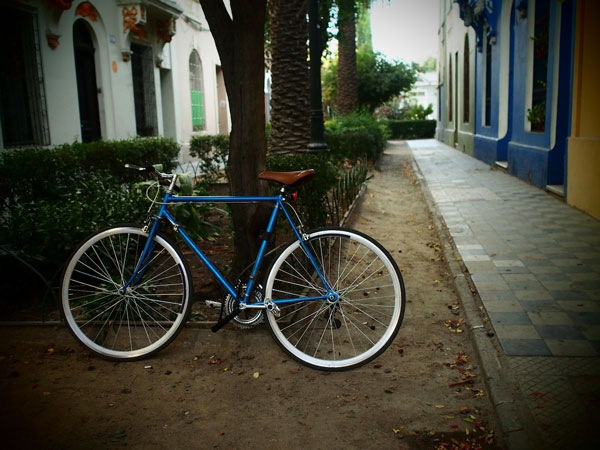It wasn’t until I heard the expression “caminar mas que Kung Fu” (lit: walk farther than Kung Fu) for about the third time that I thought to ask someone just who or what Kung Fu was, and why he walked so much. It’s not that I’m not interested in language. On the contrary. I spend so much time looking at language that sometimes I miss the point entirely. So to combat that, sometimes I just let thing slide and ask about them later, or not at all. I have kind of a rule with is called “interesting or the rule of threes.” If something is very interesting to me, or if I hear it three times, I will chase it down. Otherwise, people say things near me all the time that I don’t quite know the genesis of, and I’m pretty mellow about it, though I can hear the file cabinet of my subconsicious creaking open and the scritch of a pencil against my mental index cards (white, lined), even as I follow the conversation into the future.
Well you can thank Abby for my recent remembering of Kung Fu, due to a recent blog post of hers where she talks about Chilean expressions. One day three of my friends and I decided to go for a walk. In the end, we walked up to the Parque Bicentenario and most of the way back downtown, including a little amble around the park while we were there. When we got back, I “mapped my run” (except this was a walk) and discovered that it was on the order of 20ish kilometers, or about 12 miles. I later commented to one of the saga-walk participants that I love to go out on walks, but not necessarily such long ones.
And there it was again. “Sip, si ese día caminamos mas que Kung Fu!” (yep, that day we walked a hell of a long way).
So I asked. It turns out Kung Fu was a tv program on in the United States from 1972-1975 that featured an orphaned Shaolin priest and martial arts master wandering the Western United States in search of his lost half-brother. The kicker here is that I have never seen the show, not even in syndication, but here in Chile, enough people have seen it (in reruns, I imagine, given the age of the people involved) to generate this expression, which seems mildly racist on its face, but Chileans disavow most knowlege of any presence of racism, so I’m not really sure how to handle this particular question, other than to avoid it.
So there you have it. Sometimes I walk more than an allegedly half-Chinese fictional character portrayed by a white man who existed on television in the 1970s, and into later years in Chile. I’m beginning to understand the shorthand, even though I still probably won’t use it.










I was going to ask what this meant, and then there it was, a magical answer in the form of a blog post. Never heard this one before, maybe I'll whip it out when I need to really impress someone..bahahaha.
My boyfriend constantly uses this one… but I prefer the cartero de campo expression!
"Kwai Chang Caine" was the name of the character protrayed by David Carradine in Kung Fu. It was aired on Chilean TV during the late 70´s and 80´s, and much like "El Chavo del Ocho", everyone here saw it at some point of their lives.
What I don´t understand is why saying "caminar más que Kung Fu" can be somehow racist. The character could be anyone from any race (in what moment race became relevant in this old saying?), and still would be "caminar más que (insert tv character here)".
Could you or anyone explain why it´s racist?
@Natalie "cartero de campo" es muy buena xD
OMG! This is hilarious! I have never heard this expression (or maybe just chose to ignore it). Your post made me laugh out loud!
Marmo, it sounds racist (without context) to me for the same reason I prefer the English expression "work like a dog" to the Chilean expression "trabajar como chino." It's just that without knowing why (in this case, because of the story behind the character), it sounds to my ear like an overgeneralization about a certain set of people (in this case, faceless Asian guy, who was actually played by a white guy, which is strange, if not racist, and probably both). Nothing deeper than that, and while I think Chilean sensibility might be dialed down a bit too low about racism, my own is probably dialed up a bit too high at times.
Abby, yes, thanks for inspiring the post.
Natalie, I love your comments, so sweet, but what? could it be that you have no blog? Who are you? (kidding, mostly)
Joanna, glad you liked it, and living as you do in the middle.of.nowhere, it has to be true that you sometimes walk more than kung fu. Loved, loved, loved the dolphin video. Want to come see them. In the summer. Or in a plastic bubble. Your weather freaks me out!
No entiendo que tiene que ver con racismo, creo que es algo de idiosincracia gringa, han tenido tantos problemas con el racismo que a todo lo tildan de racista.
I think this is an interesting topic. I might be wrong, but I have the impression that Americans are over sensitive about race. (Maybe Chileans are low sensitive), but taking your example, "trabajar como chino" (work like a Chinese) refers to someone that work tirelessly, it´s not a negative reference. So, even when someone uses an expresion in a positive manner, it´s racist?
In the case of Kung Fu, everyone called the character "Kung Fu", because that was the show´s name, but wasn´t a generalization.
And you´re right, a Chinese played by a white guy, was strange, but no one gave much thought about it here, at least.
I had long ago a school friend who came from the U.S. and everyone called him "el negro". After a few months, he understood that no one was attacking him, but it must have been difficult for him to endure the first months.
Anonymous- y sí, es otra manera de ver las cosas, y de usar el lenguaje. Verás que ningún gringo (o en este caso gringa) me insiste que no es nada racista ni que no tiene matiz de ofensivo. No digo que yo tengo la razón y tú (o chilenos en general) no la tiene, sino que a mi me generaba una reacción mas negativa que neutra la expresión sin saber de donde venía. Ahora no sé si la veo tan mal, pero aún no sé si la uso tampoco. Y si eso se ser muy sensible, será!
Marmo
I think in general, what sounds like racism to me is the overgeneralization. Surely there are Chinese people who don't like to work, or who live a life of leisure. Creating the concept of "Chinese=works hard" is a stereotype, and as such, it leaves people out, leaves them behind. It doesn't matter to me if it's considered a positive spin, it's an overgeneralization, a stereotype, and that's what I'm reacting to.
Saying "trabajar como chino" to me is one step removed from when I would tell Chileans about the problems I had where I lived in Washington, DC, and among them, the drug dealers that liked to sit on my front porch. "Eran negros?" (Were they black, for those of you following along). And whether or not they were is irrelevant to the story. I think we can all agree that having drug dealers sitting on your front porch, regardless of race, class or culture, is not desirable.
Gringos are more sensitive about racism, surely, but if you look at it with more distance, it's actually that we are more sensitive about language in general. No one is called fatty, bignose, big belly. It's not that I think that Chileans are wrong, and that gringos are right. Perhaps from a Chilean perspective we are too sensitive (in general, and a stereotype!) about language. Or maybe it's just me. But I was born and raised in the United States, and like my gringo accent, this is something I won't easily part with.
Thanks for engaging in this discussion, really!
And thanks for your explanation, really, I appreciate it. This point about language is something that somehow bothers me a little (I don´t think it´s wrong, just uncomfortable), with all the terms and euphemisms that appear specially in American English, like "African American", I´v never heard or dead about an "African English", or "African Russian", "African Australian" or any other like that. I think that maybe, it´s about what anon said.
My Chilean logic (that also might be wrong, or right or something in between) is that being Chinese, or Negro, or anything, is not something wrong. In latin culture in general, those terms don´t have the same emotional charge that they seem to have in English, in America in particular, and to me at least, in their uncanny effort to be politically correct, gringos achieve the opposite effect (note that I used the word gringo, and a few days ago a journalist used the term and was accused of racism, you know that here in Chile that´s not a derogatory term), and what they actually say to someone, when they say, for example, "African American", is that the word Black,or Negro, is some form of insult, that being black is a bad thing, "we wont call you that (despite the fact that we all known you are), so to not hurt your feelings, we´ll call you African American, poor thing".It feels from here, like "we won´t call you what the rest of the world calls you, we´ll come up with some term to avoid calling you what you are. You can be ashamed for what you are and use your own identity as an insult from now on"
Then, always when I read stuff like that I think, "and what´s wrong with being black, or Chinese, or anything, that they have to invent some funny terms to avoid hurting people, for the freaking use of a word!" What hurts people is what´s on people hearts and minds, the actions and attitudes that have roots in those stereotypes. I´ve seen, even on TV, that someone can be pc and call "Asian Americans" to a group of people and transmit the same negative charge and stereotype that using the word "Chinese" or "Vietnamese" could have.
Disculpa que me extienda tanto, es que es un tema muy interesante para mí. Muchas gracias por tu explicación, de verdad, me ayuda a entender mejor todo esto.
Eileen – there are dolphins and penguins waiting for you whenever you decide to come see them 🙂
For what it's worth "trabajar como chino" has also always made me cringe. I guess it's because of the over generalization of it. And also, who's to say it's a positive spin? A lot of Chinese people work long hard hours because they have to, because they live somewhere where labor conditions are horrible and they are some what forced into it. So being sensitive to their reality is a good thing. It does not necessarily mean you are being overly sensitive to racism but instead respectful of what people of different cultures and realities deal with.
Interesting! I (gringa) didn't make a racial connection with the saying caminar más que Kung Fu, and I think I have the same kind of try-not-to-stereotype raday as Eileen.
In Argentina the saying is "trabajar como un/a negro/a" which is clearly cringe-inducing to me. A lot of my "progre" friends use that expression pretty often. I think they just don't question the possible implications of using sayings that, to them, are stock phrases. It's hard to question something that's so naturalized. To an outsider it has a very different ring to it.
I wonder how Chileans react to hearing this variant, and if they also classify it as a "positive" stereotype.
Hey Marmo,
I feel like we could sit and talk about this at length. Briefly, I believe it is up to members of a group what they wish to be called. I am Jewish, for example. And if you listen to me carefully, I never use the word "Jew." I say "Jewish person." That is because for some reason, when a nonJewish person says "Jew" it often sounds rude to me. I am teaching people by the way I talk how I prefer to be addressed.
Likewise, if a community says, hey, don't say this, say that, I buy it. I do it. (and the word Negro hasn't been used in the US since the 60s, I'm not sure if you meant the n-word, which I won't even type). For what it's worth African American and black are both used in the United States nowadays, and neither is considered offensive. Interestingly, in Chile once I was talking about someone black, and I used the word "negro" and I was corrected, to "moreno" (dark-skinned for non-Spanish speakers). And I was like, no, I meant black, not dark-skinned.
I feel like we all have a long way to go on this, but only good things can come from taking about it.
BTW, the expressions "trabajar como negro/chino" don't have to do at all with percieved stereotypes, but with slavery, so we say it instead of "trabajar como esclavo". Chileans are more familiar with the Chinese slave trade in Peru, but some other countries had black slaves, so they use the other expression.
I don't think "caminar más que Kung Fu" is racist at all, because it deals with a tv character and most people are familiar with the show (I don't remember seeing it, but my mom was a fan), but then again, as you say, I'm culturally driven to dial down my sensitivity to those issues, because here it isn't considered such a big deal. I remember we had a conversation on this topic a while ago and I have a funny story regarding silly nicknames using racial characteristics that don't belong, but I already typed too much and now it's not the time nor place for it.
I totally agree with Marmo. I think Americans are much more sensitive with words than us, which is good in many cases, but it also leads to exaggerations and an extreme fear of words in other occasions. For us, most times it all depends on the tone, the context and the relation between the people involved. Gringo, negro (commonly used among us as an endearment term for dark-skinned people), chino, etc., are not derogatory per se. It all depends on how you use them. They can even be positive.
In the case of the saying about Kung Fu, I agree with the rest of the Chileans here, that it has nothing to do with race. Not by far. It's not even a generalization. It was just the name of a show that had a guy walking all the time. It's a funny expression, not offensive to anybody. Walking a long way is not a bad thing either. So to me, that would be an example of over-sensitivity, if you perceive it as offensive only because it happens to refer to somebody with a foreign term!
Trabajar como chino may be debatable, because it is a generalization, although it's not used in a derogatory or offensive way. It's not racist for us, but I do understand a gringo may not like it.
It's obviously a cultural difference. And as usual, both extremes are always bad. We should be careful with the way we say things (probably more than some Chileans or Latin people are), but we can also be total racists without using any "forbidden" word. And we can't be so afraid of words that we can never use them. As Marmo said, there's nothing wrong with being black, Chinese, Latino, etc., so those words shouldn't be considered insults. Unless they are used to insult somebody! And in that case, you can always tell the difference.
When I was studying in Spain, people thought they should be careful with the word sudamericano, that I would be offended if they say I had a South American accent, for example. But I had a South American accent! I am sudamericana!!!! What's wrong with that? Why should I be offended? Actually, the fact that they thought I should be offended just by the word, that my origin was an insult, that's what was offensive. A lot of things they did were racist and prejudiced and offensive. Using the word sudamericano was not.
Saludos,
Hi again,
I don't mind to be annoying… but the discussion is interesting and I kept thinking about the generalizations… (e.g., the expression trabajar como chino). The thing is, we (human beings) do generalize all the time and we have to, in order to understand the world. Otherwise, nobody could write a travel blog like this one. We couldn't have opinions about most things, since we haven't experienced everything first hand all the time. We couldn't be having this discussion about how sensitive Chileans vs Americans are about words.
What's wrong is to use generalization and stereotypes to hurt people, to reject somebody just because they have a certain race, nationality, religion, age, gender, etc., etc. The problem is when ignorance and prejudice don't allow you to get to know somebody. But it's true that people from a place (or whatever) share some characteristics, and there's no point on trying to pretend it's not true. You just have to be aware of the fact that it's obviously a generalization.
That's why that kind of expressions don't bother us here, as long as they don't have an intention to insult or hurt. Just acknowledging we have differences is not a bad thing. Is not a bad thing that those differences exist either. What would be the fun in travelling if we were all exactly the same around the world?
Having said that, I would like to add that a good thing about the importance that Americans (or English speakers) give to words is that it also means they keep their word more often that people here do (I don't include myself in this, but again, it's a generalization). We may not get offended so easily by words, but at the same time, when we say: "te llamo mañana" or "llego a las 5", words may mean nothing too, unfortunately…
So I guess, there's 2 sides to everything 🙂
indeed no blog… I must say I have been following yours for a while and felt I really should comment sometime. I spent 7 months in Chile last year and fell in love – both with the country and my very own Chileno, and went back at Christmas. I love reading your blog – it makes me just that bit closer to a place that strangely feels very much like home
Wow! Great discussion! Coming into it a bit late, but for what it's worth, a few thoughts of my own…
I DO remember the program and remember being infatuated with David Carradine (who, by the way, was Bill in "Kill Bill" and who does have something of an Asian air about his face).
I've never heard anyone use the expression, but understood it immediately because I made the association with the show and would never have even given a thought to it being racist. And yes, as a gringa, I too have been trained to be language-sensitive, but I think we do go too far sometimes.
Some very interesting points have been made here, such as Clara's comment about feeling more insulted by people thinking she would be insulted by them referring to her as South American, when in fact she is indeed from South America! Now, if someone called her Sudaca, I think there would be a whole different reaction, right?
Here in Chile I don't mind being called gringa at all… but when someone says "Yankee" I stand alert (although I AM, in fact, a Yankee, being that I was orn & raised in the northern half of the US, although most Latinos do not understand the historic distinction between Yanks and Rebels, but rather seem to use it as a derrogatory term for people from the US)
Also interesting Eileen that you make the distinction between Jew and Jewish person. Never knew that. Thanks for pointing it out. Would like to understand more about the distinction between the 2 terms.
Again- great intercultural linguistic discussion!